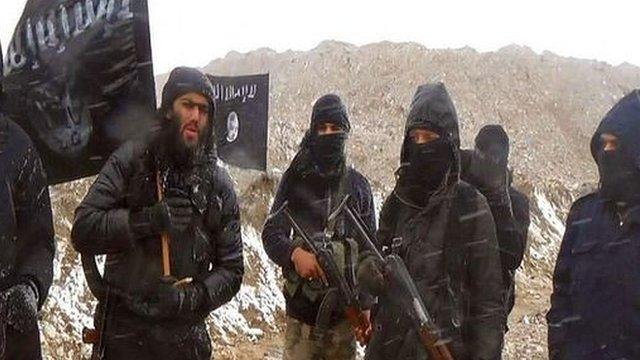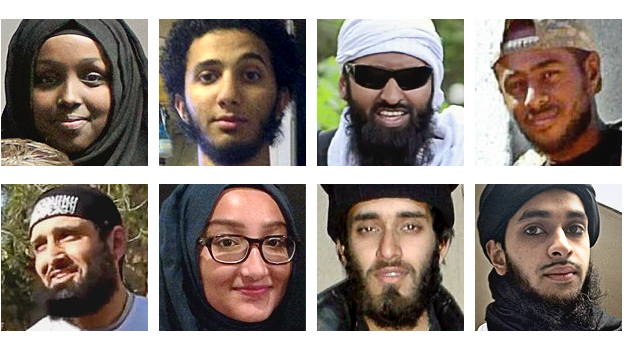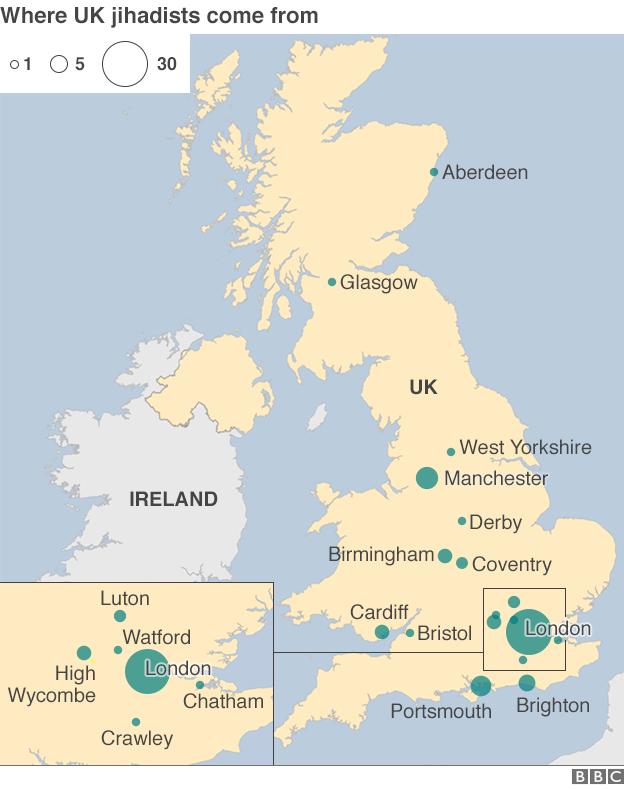The Britons signing up for Jihad
- Published
- comments

Ifthekar Jaman used his online status to attract others to his cause
When Ifthekar Jaman, from Portsmouth, arrived in Syria in 2013 and began posting images of himself posing as a jihadist fighter - and, somewhat bizarrely, occasional pictures of cats - he seemed something of an exception.
Here was a 23-year-old who had arrived in the middle of an increasingly internecine conflict, saying it was his duty to take up arms because he saw Muslims being slaughtered.
Two years on, he is dead - and we now know how far from an exception he was.
BBC News has been tracking the story of these men and women - and boys and girls - for the past few months in an attempt to map the scale of the jihad in Syria and Iraq.
Abdul Waheed Majid was the first British suicide bomber in Syria.
The result is a "snapshot" database of their stories, which reveals their links to each other, where they came from and ended up, what we know about their motivations - and what happened to them.

Tracking Britain's jihadists

It includes the stories of:
36 who are reported to have died
15 who have been convicted by the courts in England
many others we have established to be alive and active in Syria or Iraq

Thousands of young Muslims from the West have gone to fight alongside the various jihadist groups vying for supremacy in the region.
Zahra and Salma Halane are teenage twins from Manchester, who travelled to join Islamic State in the summer of 2014.
Security officials estimate some 600 Britons have gone over - and while about half may have returned, many are still out there - and some have died.
And despite the pretty obvious horror of it all, click on the news every morning and there is another tale of someone trying to cross the border.
Our research team has looked at hundreds of Britons who have been reported to have gone to Syria and Iraq.
The work has focused exclusively on those thought to have gone to fight and has excluded anyone who has come and gone from the region for a purely humanitarian or aid-related reason.
We have excluded individuals we believe to be fighting or supporting IS where the available information cannot be verified to a high enough threshold.
We have focused on jihadist fighters, which is why we haven't included those thought to be fighting against IS.
We have taken extensive steps to confirm each story through a variety of means.

Sources for BBC database:
information provided in open court, or by governments or security agencies
information volunteered by relatives
BBC research to verify individual accounts
information from other credible sources who have assisted the BBC

The list of conflict-related convictions includes not only people who have travelled to the region, but those who have been convicted of offences relating to the conflict.
So what does the data tell us? For a start, many of those who have gone to Syria or Iraq have done so in clusters.
Take Ifthekar Jaman's hometown of Portsmouth, for example.
He was the first to go - but he was followed by friends. One of them, Madhi Hassan, is one of three now dead. Another, Mashudur Choudhury, was the first to be convicted of a Syria-related offence, after he returned.
This cluster relied on friendship and geography - but there are also ties developed via social media.
We know that Jaman played a key role in the movement of a cluster of young men from Cardiff and Manchester.
Friendship and online links have both played a role in the decisions of 11 girls and women to travel to the region, such as the four teenagers from east London who went missing in recent months.
Siddartha Dhar was arrested on terror charges in the UK, but escaped on bail and made it to Syria with his family
Late last year, some security chiefs across the West thought that the numbers going to the region were levelling off because many would-be travellers had now come to understand the true nature of the self-styled Islamic State's aims and barbarity.
That meant those still determined to go were hardcore jihadist sympathisers - and they were presumed to be a small group.
Whether that analysis still stands is open to question.
Security services across the West and Turkey have come under pressure to do more to stop people entering Syria - but there is a general consensus in governments that IS's social-media machine - and its facilitators - are remarkably adept at targeting and indoctrinating vulnerable young people.
A spate of high-profile media reports of individual cases may suggest the numbers have gone up again - but it is simply too early to tell for sure.
The true picture will only become clearer as we add more stories to this project in the months to come.

This map shows the hometowns of those believed to have travelled to Syria or Iraq to fight with or support jihadist groups and those convicted of offences relating to the conflict